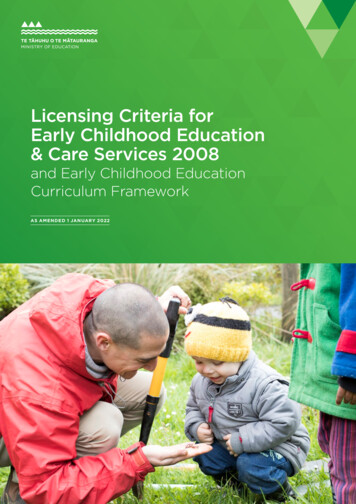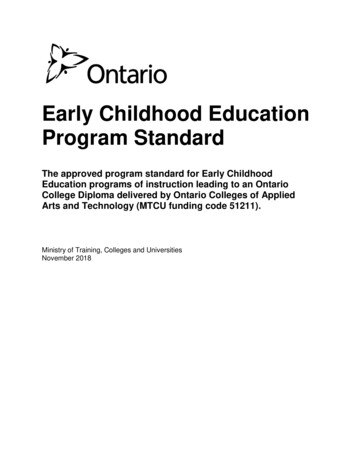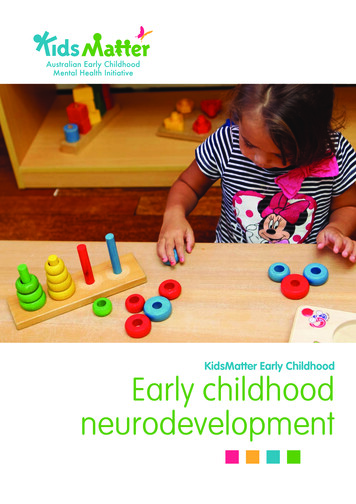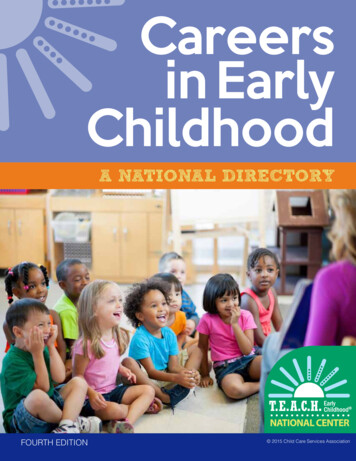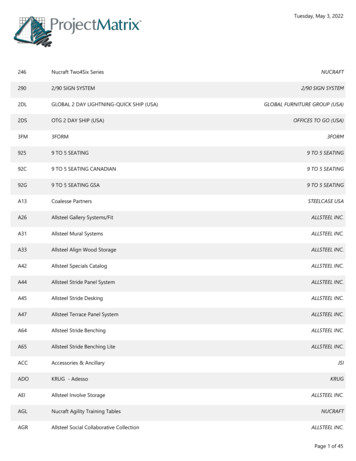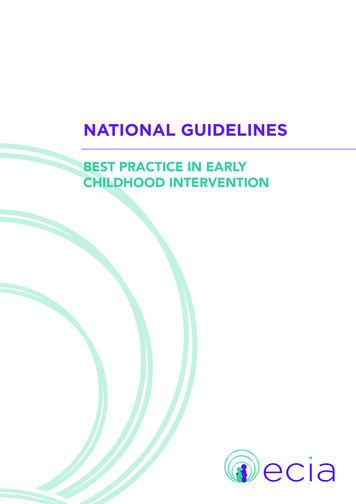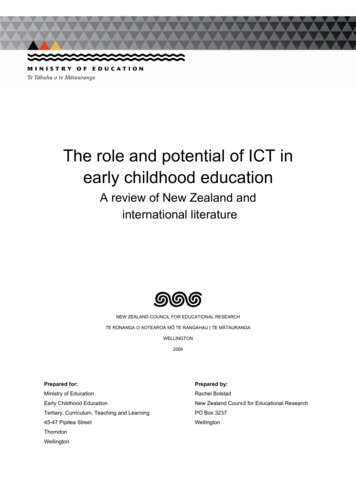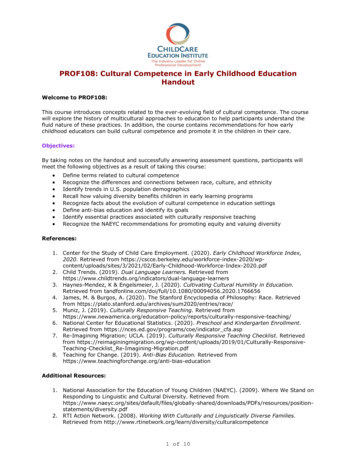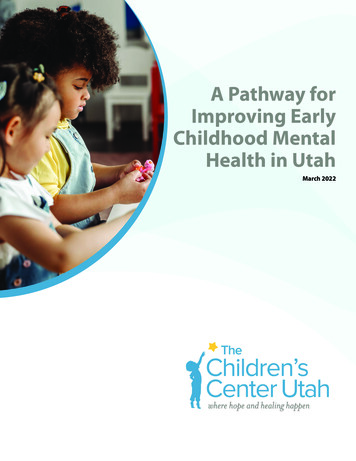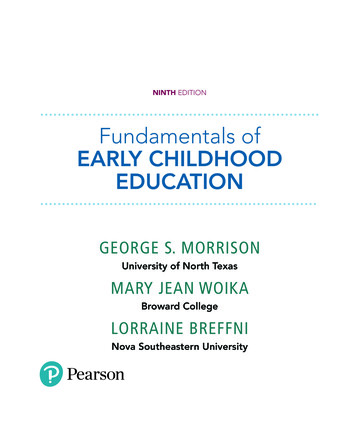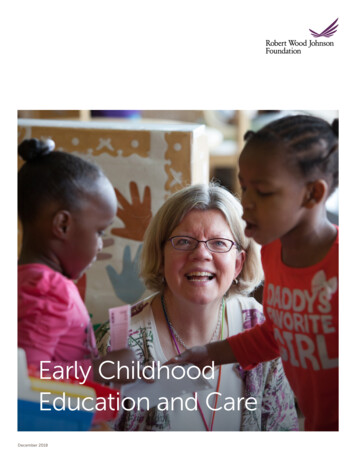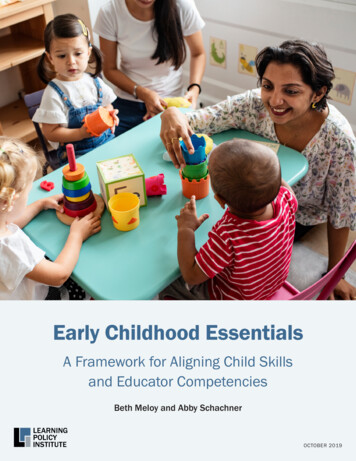
Transcription
Early Childhood EssentialsA Framework for Aligning Child Skillsand Educator CompetenciesBeth Meloy and Abby SchachnerOCTOBER 2019
Early Childhood Essentials:A Framework for Aligning ChildSkills and Educator CompetenciesBeth Meloy and Abby Schachner
AcknowledgmentsThe authors thank our Learning Policy Institute (LPI) colleagues Maya Kaul and Charlie Thompsonfor their research contributions, and Madelyn Gardner and Hanna Melnick for their review andthought partnership. In addition, we thank Erin Chase and Aaron Reeves for their editing and designcontributions to this project, along with Gretchen Wright and the entire LPI communications teamfor their invaluable support in developing and disseminating this report. Without their generosityof time and spirit, this work would not have been possible.This work was supported by a grant from the David and Lucile Packard Foundation. Core operatingsupport for LPI is provided by the Sandler Foundation, the William and Flora Hewlett Foundation,and the Ford Foundation. We are grateful to them for their generous support. The ideas voiced hereare those of the authors and not those of our funders.Expert WorkgroupThis work was prepared in consultation with and benefited from the insights and expertise of RanaeAmezquita, Krischa Esquivel, Nancy Hurlbut, Sydney Fisher Larson, Peter Mangione, Scott Moore,Mary Vixie Sandy, Vilma Serrano, Deborah Stipek, Erin Sullivan, Ross A. Thompson, and MarleneZepeda. We thank them for the care and attention they gave this report.The appropriate citation for this report is: Meloy, B., & Schachner, A. (2019). Early childhoodessentials: A framework for aligning child skills and educator competencies. Palo Alto, CA: LearningPolicy Institute.This report can be found online y-childhood-essentials-framework.This work is licensed under the Creative Commons Attribution-NonCommercial 4.0 InternationalLicense. To view a copy of this license, visit ort originally published October 15, 2019 Document last revised November 20, 2019Revisions are noted here: te.iiLEARNING POLICY INSTITUTE EARLY CHILDHOOD ESSENTIALS
Table of ContentsExecutive Summary. vBackground.1The Framework.2Foundational Conditions for Children to Learn.3Essential Child Skills.4Social-Emotional Development.6Cognitive Development.8Language and Literacy Development. 10Mathematical and Scientific Reasoning. 12Physical Development. 14Foundational Conditions for Educators. 16Essential Educator Competencies. 17Developmentally Appropriate Practice and Environments . 17Observation and Assessment of Development and Learning. 22Individualized Supports and Inclusion-Based Practices . 24Family Support and Partnership. 26Continuous Improvement and Professionalism. 27Conclusion. 29Appendix A: Resources. 30Endnotes. 33About the Authors. 38List of FiguresFigure 1Early Childhood Essentials Framework.5LEARNING POLICY INSTITUTE EARLY CHILDHOOD ESSENTIALSiii
ivLEARNING POLICY INSTITUTE EARLY CHILDHOOD ESSENTIALS
Executive SummaryResearchers across a wide range of disciplines agree that early childhood education has thepotential to help support optimal development and contribute to ensuring that all children enterschool ready to succeed. Well-designed and well-implemented early childhood programs can fostermeaningful gains in school readiness, as well as long-term benefits such as lower rates of specialeducation placement, reduced grade retention, and higher graduation rates. High-quality earlyeducation also has the potential to narrow achievement gaps when young children gain the mostfrom the experience.Central to high-quality early childhood experiences is the ability of early childhood educators (earlyeducators) to offer instruction that fosters the skills children need to succeed in school and in life.Further, children’s development is supported by a thoughtful progression from early learning goalsand objectives to instruction in the elementary grades. In order to ensure continuity and improvechild outcomes, educators and education leaders from birth through age 8 must maintain a clear,concise, and developmentally appropriate delineation of the goals, objectives, and approaches toteaching and learning.The purpose of the Early Childhood Essentials Framework is to synthesize and communicate theessential skills and competencies children should be acquiring before they enter kindergarten andthe related skills and competencies early childhood educators must cultivate in order to providehigh-quality early learning experiences that will set all children on the path to success in schooland in life. The unique goals of this framework are to clearly convey the link between early educatorcompetencies, early education practice, and the school readiness and success of all children andto acknowledge the foundational conditions necessary for children and educators to achievethese essential skills and competencies. This framework provides a baseline of knowledge to helpdecision-makers think critically about how to improve the early learning programs they oversee.The Essential Child SkillsThroughout this framework, essential child skills are defined as those skills that predict later schoolsuccess or are foundational to predictive skills. We analyzed the body of research and guidance thatdescribes developmental trajectories of essential skills for infants, toddlers, and preschoolers thatcan be influenced and scaffolded by educator practice. From our analysis, we identified five keydevelopmental areas:1. Social-emotional development refers to children’s abilities to engage in meaningfulrelationships with adults and peers; recognize, express, and regulate their ownemotions and respond appropriately to the emotions of others; and develop social skillsand understanding.2. Cognitive development includes children’s abilities to engage in imitation and symbolicplay as well as their early cognitive skills of executive function, such as holding andmanipulating information in their minds, sustaining their attention on a task, shifting theirattention when appropriate, and controlling their impulses.LEARNING POLICY INSTITUTE EARLY CHILDHOOD ESSENTIALSv
3. Language and literacy development captures the ability of children to communicateeffectively along a continuum that includes gestures, facial expressions, and eventuallylanguage to communicate needs, emotions, and thoughts, as well as early literacy skills thatlay the foundation for children to become successful readers and writers as they enter school.4. Mathematical and scientific reasoning encompasses the development of skills such asnumber sense, algebraic and geometric thinking, and spatial awareness and measurement,as well as young children’s emerging exploration and discovery skills that develop intointentional scientific inquiry skills as they master their worlds.5. Physical development refers to a range of skills, most commonly motor development,that support children’s abilities to explore their environments fully and interact withpeople and things.Research shows that children develop these discrete skills in a highly integrated progression. Achild’s progress in developing one skill set can accelerate or impede progress in another area.The Essential Early Educator CompetenciesThroughout this framework, we define essential educator competencies as those identified byresearchers and practitioners as critical for providing children with learning and play experiencesthat promote development of the essential child skills. Based on an analysis of the research andguidance on the essential skills for educators of infants, toddlers, and preschoolers across settings,we identified five key competency areas:1. Developmentally appropriate practice and environments refer to an educator’sknowledge and use of developmentally appropriate practices to support and guidechildren’s learning across and within each essential child skill area, as well as his or herability to effectively construct and manage physically and emotionally supportive learningenvironments and activities to match the age, cultural, and individual needs of children.2. Observation and assessment of development and learning encompass an educator’sability to regularly identify, select, and use observation techniques and assessments tounderstand the learning progression and trajectory of each child to individualize learning,including techniques that are sensitive to and appropriate for children from non-Englishspeaking homes and who may have experienced trauma and adverse childhood experiences.3. Individualized supports and inclusion-based practices capture an educator’s ability toprovide safe and inclusive learning environments and activities; to individualize learningexperiences to support all learners, including dual language learners, children with specialneeds, children who exceed developmental expectations for their age, and children whoexperience trauma and adverse childhood experiences; and to work collaboratively with amultidisciplinary team and the family to provide individualized supports.4. Family support and partnership include an educator’s ability to initiate and engage inregular and responsive communication with families, collaborate with families to ensureconsistency between home and the learning environment, and support culturally andlinguistically diverse families.viLEARNING POLICY INSTITUTE EARLY CHILDHOOD ESSENTIALS
5. Continuous improvement and professionalism recognize that early educators areprofessionals and should have the ability and opportunity to engage in reflection, developand use professional development plans, participate in professional learning, developcollaborative leadership skills, and maintain professional and ethical standards to excel.Early educators need to acquire and refine each of these competencies, which work holistically.Effective educators must be able to utilize developmentally appropriate practices and environmentsto observe and assess children’s development and learning, and ultimately provide individualizedsupports and inclusion-based practices. Likewise, educators’ competencies in continuousimprovement and professionalism and their abilities to engage in family support and partnershipwill support their capacity to provide high-quality learning experiences that fulfill the promise ofearly education for every child.Foundational ConditionsTo thrive, young children need to be healthy and feel safe and secure at home and in their earlylearning setting. Early childhood programs have a role to play in helping to ensure all childrenhave their basic needs met by participating in the comprehensive system of services for childrenand families, referring families to community resources, or, in some cases, providing directservices that children need to thrive. This includes adequate nutrition; continuity of care; accessto physical, dental, and mental health services; stable and safe housing; and access to specializededucational supports.Similarly, for early learning programs to prepare children for academic success, early educatorsneed to be prepared, compensated, and supported to excel in the complex work of providing highquality early learning experiences. Early educators need extensive support, through college-levelpreparation and ongoing job-embedded professional development, and a supportive environmentto be able to consistently provide intentional, individualized learning activities that scaffoldeach child’s acquisition of essential skills. Currently, the odds are stacked against early educatorsachieving the competencies outlined in the framework because of poor compensation, relativelylow standards for preparation, and lack of investment in professional supports, including little or nopaid time for professional learning, planning, and collaboration.ConclusionChild development is multifaceted, and providing high-quality early learning experiences iscomplex work. Although not every decision-maker with influence over early childhood programsneeds to understand every nuance of these complex concepts, it is critical that decision-makersdevelop and maintain a basic understanding of the essential child skills and the essential educatorcompetencies and acknowledge the foundational conditions necessary for children’s readiness tolearn and educators’ abilities to succeed. This fundamental understanding will support leaders inmaking informed decisions to ensure educators have the resources they need to provide every childwith the opportunity to enter school ready to thrive.LEARNING POLICY INSTITUTE EARLY CHILDHOOD ESSENTIALSvii
viiiLEARNING POLICY INSTITUTE EARLY CHILDHOOD ESSENTIALS
BackgroundThere is overwhelming evidence that children’s early years are a crucial time for their development.1Researchers across a wide range of disciplines—program evaluators, neuroscientists, geneticists,and economists—agree that early childhood education has the potential to support optimaldevelopment and ensure all children start kindergarten ready to succeed. And when it comes toearly childhood education programs, quality is critical. Well-designed and well-implementedprograms can foster meaningful gains in school readiness, as well as long-term benefits such aslower rates of special education placement, reduced grade retention, and higher graduation rates.2High-quality early education also has the potential to narrow achievement gaps when vulnerablepopulations of young children, including children from low-income families and dual languagelearners (DLLs), gain the most from the experience.3Lasting benefits for children depend upon high-quality learning experiences from birth throughthe elementary grades.4 The early learning continuum is enhanced throughout childhood whenthere is a thoughtful progression from early learning goals and objectives to instruction in theelementary grades. Aligning goals, objectives, and approaches to teaching and learning from birththrough age 8 requires educators and education leaders to maintain a clear and concise delineationof what children need to know and be able to do. This information is a fundamental resource forall early childhood educators (early educators) across diverse settings, including family child carehomes, child care centers, preschools, and public school systems, because it is critical to every earlyeducator’s ability to craft individualized high-quality early learning opportunities for all children.Furthermore, education leaders must understand the knowledge and skills that early educatorsneed to consistently cultivate as professionals in order to implement the practices necessary tosupport children’s development. Effective educators are able to gather information about childhooddevelopment through observation, assessment, and conversations with families and use this criticalcontextual information to appropriately support and individualize learning activities for everychild. Effective educators are able to craft early learning opportunities across the developmentalspectrum, including social-emotional, cognitive, language and literacy, mathematics and science,and physical development. Early educators also consistently cultivate their knowledge and skillsto better support diverse populations of children, including DLLs; children who have experiencedadverse childhood experiences, chronic stress, or trauma;5 and children whose progress falls outsideof typical developmental trajectories.Young children need be healthy and feel safe and secure at home as well as in their early learningsetting in order to be ready to learn. Early childhood programs have a role to play in the systemresponsible for ensuring every child has access to the services and supports he or she needs tothrive, including adequate nutrition; continuity of care; access to physical, dental, and mentalhealth services; stable and safe housing; and access to specialized educational supports (formore detail, see “Foundational Conditions for Children to Learn” on page 3). Although the roleof individual early learning programs will vary, it is critical that leaders and early educatorsunderstand the importance of children’s basic needs being met and actively engage in the system asappropriate to support children and families in accessing services.LEARNING POLICY INSTITUTE EARLY CHILDHOOD ESSENTIALS1
Similarly, early educators need extensive support, through college-level preparation and ongoingjob-embedded professional development, and a supportive environment to be able to consistentlyprovide intentional, individualized learning activities that scaffold each child’s acquisition ofessential skills (for more detail, see “Foundational Conditions for Educators” on page 16).This framework is intended to provide an overview of the importance and complexity of earlychildhood development and offer insight into the competencies early educators must cultivate inorder to provide high-quality early learning experiences that will set all children on the path tosuccess in school and in life. State and local policymakers, as well as local early education leaders,including program administrators, site supervisors, center directors, family child care homeeducation networks, resource and referral agencies, school principals, and school board members,directly influence preparation and professional development, play an important role in funding tosupport compensation for early educators, and often directly oversee early learning environments.It is critical that these decision-makers understand the developmental trajectory of essential childskills and the role of educator competencies in supporting skill development for all children so thatthey invest in and deliver the supports that early educators need to help young children succeed.This framework helps to provide a baseline of knowledge to aid decision-makers in thinkingcritically about how to improve the early learning programs they oversee. For additional documentsand resources that provide a deeper discussion of the topics this framework explores, see AppendixA. Readers who wish to build upon the knowledge they gain from reviewing this framework areencouraged to explore these other resources.The FrameworkThe purpose of the Early Childhood Essentials Framework, described here and shown in Figure 1, isto synthesize and communicate the literature on essential child skills and educator competencies.This framework joins other documents, in California and nationwide, aimed at describingthese skills (see Appendix A). Specifically, the framework presents the typical developmentaltrajectories of essential child skills that are critical for all adults involved in the early educationsystem to understand. The framework also provides a review of effective educator competenciesthat should be cultivated in and by all early educators in order to provide high-quality, effectiveearly learning opportunities. The unique goals of the framework are to clearly convey the linkbetween early educator competencies, early education practice, and the school readiness andsuccess of all children and to acknowledge the foundational conditions necessary for childrenand educators to achieve these essential skills and competencies. Early education leaders needthe information conveyed here to be able to support children and educators across diverse earlylearning environments.2LEARNING POLICY INSTITUTE EARLY CHILDHOOD ESSENTIALS
Foundational Conditions for Children to LearnIn order for young children to thrive, they need to be healthy and feel safe and secure at homeand in their early learning settings. The research identifies five basic needs that must be met forchildren to be ready to learn.6 Each of these conditions is critical to a child’s health and well-beingand lays the foundation for his or her ability to learn effectively from early childhood experiences.These conditions are: adequate nutrition; continuity of care; access to health services, including dental health and mental health supports; stable and safe housing; and access to specialized educational supports.Poverty is a key risk factor for young children and can fundamentally interfere with a child’sreadiness to learn. For example, poverty can negatively affect how the body and brain develop;living in poverty can impact the safety and security of a child’s housing; and children living inpoverty often lack access to health services and adequate nutrition.7 Early childhood education(ECE) programs cannot inoculate children from the effects of poverty. However, ECE programsoften play a role in helping to ensure all children have their basic needs met by participating inthe comprehensive system of services for children and families, referring families to communityresources, or, in some cases, providing direct services. Many ECE programs provide healthy mealsto children to support their access to adequate nutrition or promote continuity of care by reducingthe number of caregiver changes a child experiences within the program. Some ECE programs,such as Head Start, also play a role in referring families to social service programs that offercritical services, such as health services, housing subsidies, and specialized educational supports.Regardless of the role a program plays in meeting children’s needs, understanding the extent towhich these foundational conditions are being met is critical to appropriately supporting children’sdevelopmental progress.LEARNING POLICY INSTITUTE EARLY CHILDHOOD ESSENTIALS3
Essential Child SkillsThroughout this framework, essential child skills are defined as those skills that predict later schoolsuccess or are foundational to predictive skills. The skills included in this framework stem from ananalysis of the research and guidance that describe developmental trajectories of essential skillsfor infants, toddlers, and preschoolers and are limited to those skills that can be influenced andscaffolded by educator practice (see Appendix A). We identified five key developmental areas acrossthe early learning standards and guidance documents we reviewed:1. Social-emotional development2. Cognitive development3. Language and literacy development4. Mathematical and scientific reasoning5. Physical developmentAlthough this framework includes five discrete areas of child development and describesdevelopmental trajectories of essential skills within each of these areas, research shows thatchildren develop these discrete skills in a highly integrated progression. A child’s developmentaltrajectory in one area may be fundamentally linked to the child’s progress in another. For example,language development is foundational not only toliteracy but also to children’s ability to grasp keyA child’s developmentalmathematical concepts, manage their emotions, andtrajectory in one area may becommunicate them effectively with their educatorsand peers. Child development is also highly variable,fundamentally linked to theand individual children do not develop at the samechild’s progress in another.pace across every area. For example, a child may excelin communication and language skills but strugglewith fine motor development.Furthermore, there is a cross-cutting concept in child development, which is sometimes highlightedas its own discrete area of development, called Approaches to Learning.8 Approaches to Learninginvolves children’s initiative, curiosity, creativity, and persistence as learners. Although thisframework does not include Approaches to Learning as a stand-alone area of child development, wedo include the skills often categorized under this area throughout the framework. It is importantfor educators and education leaders to understand that supporting children’s ability to successfullynavigate learning experiences influences their development holistically and directly contributesto success in school. Research has demonstrated that particularly important aspects of becominga successful learner are developing the ability to self-regulate,9 which this framework coversunder Social-Emotional Development, and executive functioning,10 which this framework coversunder Cognitive Development. Many factors influence how children approach learning, and thisframework acknowledges that fact by integrating children’s development of curiosity, persistence,and creativity into every area of development.Although the age guidelines provided in this framework are broad, they describe the timing ofskill acquisition in typically developing children who have been appropriately supported by adults.As children age, they build on their early experiences and skills to learn more complex ways ofcommunicating with, exploring, and engaging with the world around them.4LEARNING POLICY INSTITUTE EARLY CHILDHOOD ESSENTIALS
Finally, development occurs in the context of each child’s familial, linguistic, and culturalbackgrounds. DLLs, for example, may not demonstrate the full scope of their skills when interactingwith predominantly English-speaking adults or peers. In addition, many aspects of development,especially social-emotional skills such as self-regulation and expression of emotions, may beculturally determined. For example, social and cultural conventions influence expectations toinitiate conversation, when and how to ask questions or interrupt during conversation, and whetherchildren should make eye contact or avoid it during conversation with adults.11Figure rameworkFrameworkEssential Educator CompetenciesWithin the Learning Setting Developmentally appropriatepractice and environments Observation and assessmentof development and learning Individualized supports andinclusion-based practicesSupporting the Learning Setting Family supportand partnership Continuousimprovement andprofessionalismEssential Child Skills Social-emotional development Cognitive development Language and literacy development Mathematical and scientific reasoning Physical developmentFoundational ConditionsFor Educators to SucceedFor Children to Learn Facilitative leadership Adequate nutrition Competitive compensation and benefits Job-embedded professional development Paid planning and collaboration time Continuity of care Access to physical, dental, and mental health services Stable and safe housing Emotionally supportive environment Access to specialized educational supportsLEARNING POLICY INSTITUTE EARLY CHILDHOOD ESSENTIALS5
Social-Emotional DevelopmentSocial-emotional development refers to children’s ability to engage in meaningful relationshipswith adults and peers; recognize, express, and regulate their own emotions and respondappropriately to the emotions of others; and develop social skills and understanding. There arethree key categories of skills that form the foundation of social-emotional development, whichresearch suggests are critical for later school success.First, children need to develop trusting relationships with adults early in life to feel secure and todevelop social competence. Children learn from experience, and strong bonds with their caregiversenable them to explore new relationships and environments and to expand their understanding ofthe world around them without anxiety. As children develop, they also interact with and developrelationships with each other. These interactions provide opportunities to practice communication,express and interpret emotions, and develop social skills such as problem-solving and compromise.Second, childre
early childhood education programs, quality is critical. Well-designed and well-implemented programs can foster meaningful gains in school readiness, as well as long-term benefits such as lower rates of special education placement, reduced grade retention, and higher graduation rates.2
